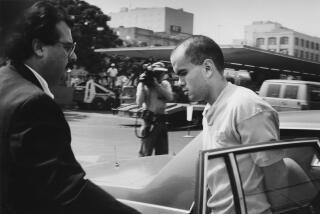Stalker’s Prey Tells of Terror
- Share via
KNBC-TV news anchor Kelly Mack’s 12-year ordeal with an obsessed fan began as innocent flattery, with gushing letters and requests for autographed photos.
Over time, however, the reported delusions of one man--and the thousands of phone calls, faxes, gifts and letters--altered Mack’s life and instilled in her a chronic sense of fear.
“I shake when I think about this,” she said recently, speaking to about 100 attorneys and law enforcement authorities at an all-day seminar. More than a dozen lecturers spoke at the event, but each shared a similar message: Don’t underestimate the tenacity of a stalker.
Ten years ago, Mack’s case might have warranted little more than a night in jail for violating a restraining order, said Rep. Edward R. Royce (R-Fullerton), one of the authors of California’s original anti-stalking law.
Since the state Legislature passed the nation’s first anti-stalker statute, however, the law has been strengthened to include the stalking of a victim’s family, to allow the issuance of emergency restraining orders and to encompass Internet stalking. Starting Jan. 1, convicted felony stalkers will face five years in prison rather than the current four-year maximum.
State law defines a stalker as anyone who “willfully, maliciously and repeatedly follows or harasses another person, and who makes a credible threat with the intent to place that person in fear for their safety or the safety of their immediate family.”
*
Experts at the seminar warned that stalkers who suffer delusions or extreme fanaticism rarely relinquish their obsessions and often resume their behavior after their release.
“The most typical reason for stalking is rage,” said Los Angeles County Deputy Dist. Atty. Rhonda B. Saunders, who won the convictions of the stalkers of Madonna and Steven Spielberg. “It’s rage because of rejection. . . . They refuse to accept responsibility. They believe the victim has set them up; the police have set them up.”
The stalking case that woke up law enforcement to the problem was that of 21-year-old actress Rebecca Schaeffer, co-star of the television show “My Sister Sam,” who opened her door to a killer in July 1989. She was shot to death on her doorstep by Robert Bardo, an obsessed fan who is serving a life term for the murder.
Although studio security guards, Schaeffer’s agent and producers all knew that Bardo had been sending threatening letters to the actress for months, no one told Schaeffer.
*
At the seminar, Mack said her attempts to keep her stalker away--private security guards, alternating her routine, regular visits from police, elaborate home security--nearly failed.
Five months ago, the accused stalker from Georgia was arrested a quarter-mile from Mack’s Burbank office after apparently driving cross-country to talk to her. He was charged with felony stalking and is awaiting trial.
Mack said she has warned her children’s teachers, her neighbors and her co-workers about her stalker in the hopes that she and her family won’t be fighting his threats alone. “They all have the knowledge that he’s out there,” she said.
More to Read
Sign up for Essential California
The most important California stories and recommendations in your inbox every morning.
You may occasionally receive promotional content from the Los Angeles Times.










